学术英语论文古希腊神话女神Introduction部分
- 格式:doc
- 大小:21.50 KB
- 文档页数:1
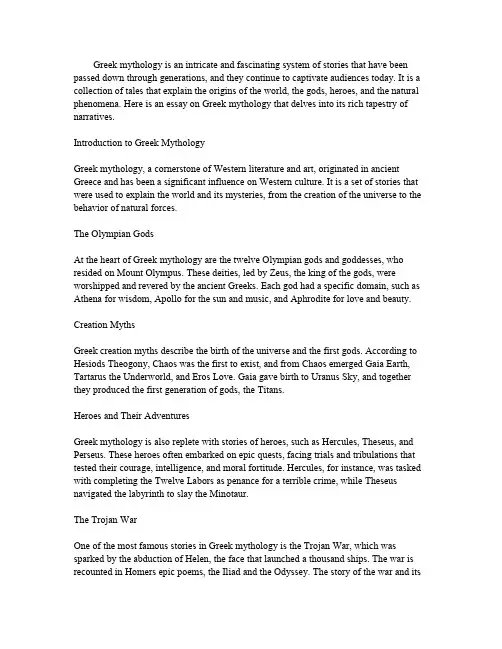
Greek mythology is an intricate and fascinating system of stories that have been passed down through generations,and they continue to captivate audiences today.It is a collection of tales that explain the origins of the world,the gods,heroes,and the natural phenomena.Here is an essay on Greek mythology that delves into its rich tapestry of narratives.Introduction to Greek MythologyGreek mythology,a cornerstone of Western literature and art,originated in ancient Greece and has been a significant influence on Western culture.It is a set of stories that were used to explain the world and its mysteries,from the creation of the universe to the behavior of natural forces.The Olympian GodsAt the heart of Greek mythology are the twelve Olympian gods and goddesses,who resided on Mount Olympus.These deities,led by Zeus,the king of the gods,were worshipped and revered by the ancient Greeks.Each god had a specific domain,such as Athena for wisdom,Apollo for the sun and music,and Aphrodite for love and beauty. Creation MythsGreek creation myths describe the birth of the universe and the first gods.According to Hesiods Theogony,Chaos was the first to exist,and from Chaos emerged Gaia Earth, Tartarus the Underworld,and Eros Love.Gaia gave birth to Uranus Sky,and together they produced the first generation of gods,the Titans.Heroes and Their AdventuresGreek mythology is also replete with stories of heroes,such as Hercules,Theseus,and Perseus.These heroes often embarked on epic quests,facing trials and tribulations that tested their courage,intelligence,and moral fortitude.Hercules,for instance,was tasked with completing the Twelve Labors as penance for a terrible crime,while Theseus navigated the labyrinth to slay the Minotaur.The Trojan WarOne of the most famous stories in Greek mythology is the Trojan War,which was sparked by the abduction of Helen,the face that launched a thousand ships.The war is recounted in Homers epic poems,the Iliad and the Odyssey.The story of the war and itsaftermath is filled with tales of valor,betrayal,and divine intervention.Mortal and Divine RelationshipsGreek myths often explore the complex relationships between mortals and deities.Gods could be capricious,intervening in human affairs for their own amusement or to further their own ends.The story of Orpheus and Eurydice,for example,shows the tragic consequences of a mortals love for a god and their attempt to defy the natural order.Moral Lessons and Cultural SignificanceGreek myths are not just entertaining stories they also serve as cautionary tales and convey moral lessons.They reflect the values and beliefs of ancient Greek society,such as the importance of hospitality,the dangers of hubris excessive pride,and the inevitability of fate.ConclusionGreek mythology continues to be a rich source of inspiration for artists,writers,and filmmakers.Its stories have been adapted and reinterpreted in countless ways, demonstrating their timeless appeal and relevance.Whether its the drama of the gods on Olympus,the bravery of legendary heroes,or the moral dilemmas faced by mortals, Greek mythology offers a window into the human condition and the enduring power of storytelling.。
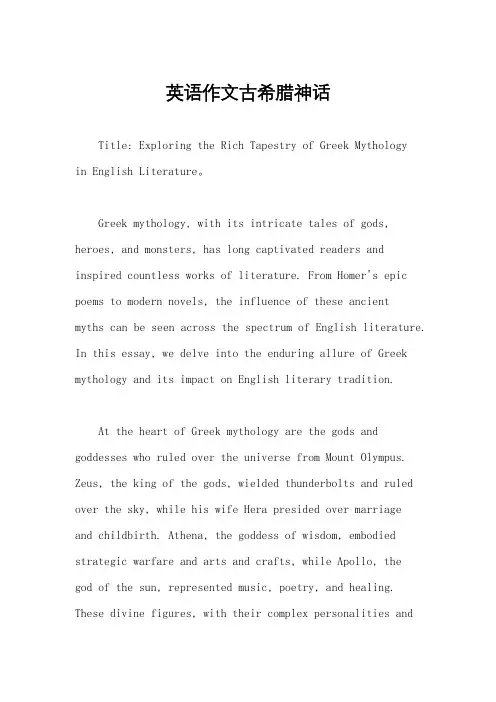
英语作文古希腊神话Title: Exploring the Rich Tapestry of Greek Mythologyin English Literature。
Greek mythology, with its intricate tales of gods, heroes, and monsters, has long captivated readers and inspired countless works of literature. From Homer's epic poems to modern novels, the influence of these ancientmyths can be seen across the spectrum of English literature. In this essay, we delve into the enduring allure of Greek mythology and its impact on English literary tradition.At the heart of Greek mythology are the gods and goddesses who ruled over the universe from Mount Olympus. Zeus, the king of the gods, wielded thunderbolts and ruled over the sky, while his wife Hera presided over marriageand childbirth. Athena, the goddess of wisdom, embodied strategic warfare and arts and crafts, while Apollo, thegod of the sun, represented music, poetry, and healing. These divine figures, with their complex personalities andsupernatural powers, provided fertile ground for literary exploration.One of the most famous works of English literature influenced by Greek mythology is Homer's "The Iliad" and "The Odyssey." These epic poems recount the exploits of Greek heroes like Achilles and Odysseus as they navigatethe challenges of war and the whims of the gods. The themes of heroism, fate, and the struggle between mortals and immortals resonate throughout these timeless works,offering readers a glimpse into the ancient Greek worldview.In addition to epic poetry, Greek mythology hasinspired countless plays, from the tragedies of Aeschylus, Sophocles, and Euripides to the comedies of Aristophanes. These playwrights brought the myths to life on the stage, exploring themes of hubris, fate, and the consequences of human ambition. Characters like Oedipus, Medea, and Prometheus have become iconic figures in the literary canon, their stories serving as cautionary tales about the perilsof defying the will of the gods.The influence of Greek mythology extends beyond ancient literature and into the realm of modern fiction. Writers like William Shakespeare drew upon classical themes and characters in works such as "A Midsummer Night's Dream" and "The Tempest," infusing their plays with elements of magic, transformation, and divine intervention. In more recent times, authors like Rick Riordan have reimagined Greek myths for a young adult audience, introducing readers to modern-day demigods and monsters in series like "Percy Jackson and the Olympians."Furthermore, Greek mythology has left its mark on English poetry, inspiring poets from John Milton to T.S. Eliot. Milton's "Paradise Lost" draws heavily from biblical and classical sources, weaving together the stories of Adam and Eve with those of Satan and the Greek Titans. Eliot's modernist masterpiece, "The Waste Land," incorporates fragments of mythological imagery to evoke a sense of cultural disintegration and spiritual desolation in the aftermath of World War I.In conclusion, Greek mythology occupies a central placein the tapestry of English literature, providing a rich source of inspiration for writers across the centuries. From epic poetry to modern fiction, the myths of ancient Greece continue to captivate readers with their timeless themes and enduring relevance. As long as there are storytellers, the gods and heroes of Mount Olympus will live on in the pages of literature, their stories serving as a testament to the enduring power of the human imagination.。
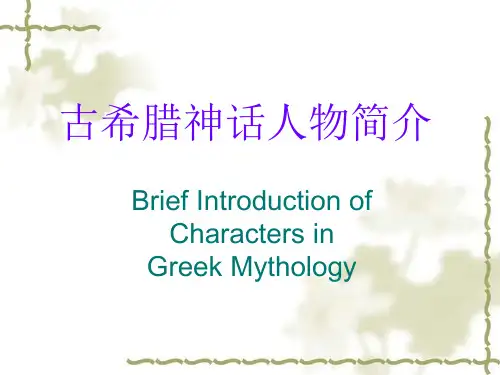
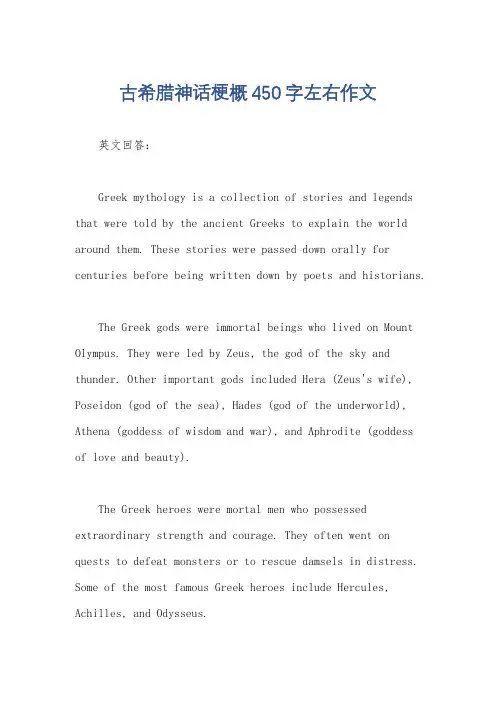
古希腊神话梗概450字左右作文英文回答:Greek mythology is a collection of stories and legends that were told by the ancient Greeks to explain the world around them. These stories were passed down orally for centuries before being written down by poets and historians.The Greek gods were immortal beings who lived on Mount Olympus. They were led by Zeus, the god of the sky and thunder. Other important gods included Hera (Zeus's wife), Poseidon (god of the sea), Hades (god of the underworld), Athena (goddess of wisdom and war), and Aphrodite (goddessof love and beauty).The Greek heroes were mortal men who possessed extraordinary strength and courage. They often went on quests to defeat monsters or to rescue damsels in distress. Some of the most famous Greek heroes include Hercules, Achilles, and Odysseus.Greek mythology has had a profound influence on Western culture. The stories of the gods and heroes have beenretold for centuries in literature, art, and music. Greek mythology also provides us with a glimpse into the beliefs and values of the ancient Greeks.中文回答:古希腊神话梗概。
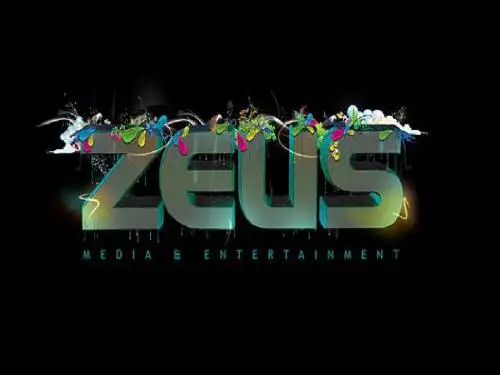
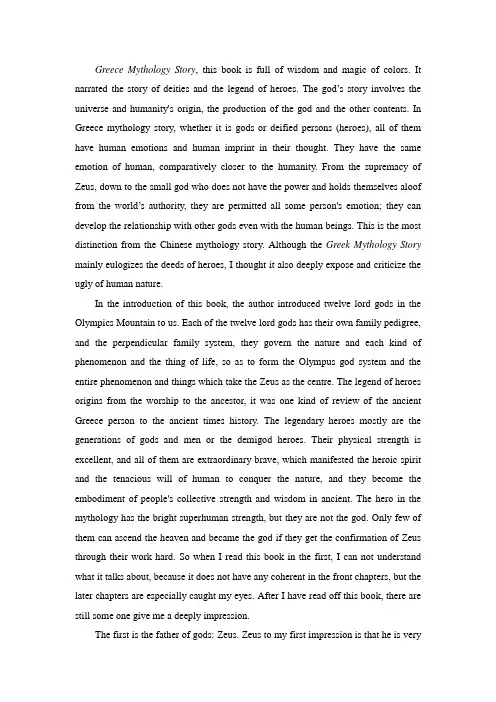
Greece Mythology Story, this book is full of wisdom and magic of colors. It narrated the story of deities and the legend of heroes. The god’s story involves the universe and humanity's origin, the production of the god and the other contents. In Greece mythology story, whether it is gods or deified persons (heroes), all of them have human emotions and human imprint in their thought. They have the same emotion of human, comparatively closer to the humanity. From the supremacy of Zeus, down to the small god who does not have the power and holds themselves aloof from the world’s authority, they are permitted all some person's emotion; they can develop the relationship with other gods even with the human beings. This is the most distinction from the Chinese mythology story. Although the Greek Mythology Story mainly eulogizes the deeds of heroes, I thought it also deeply expose and criticize the ugly of human nature.In the introduction of this book, the author introduced twelve lord gods in the Olympics Mountain to us. Each of the twelve lord gods has their own family pedigree, and the perpendicular family system, they govern the nature and each kind of phenomenon and the thing of life, so as to form the Olympus god system and the entire phenomenon and things which take the Zeus as the centre. The legend of heroes origins from the worship to the ancestor, it was one kind of review of the ancient Greece person to the ancient times history. The legendary heroes mostly are the generations of gods and men or the demigod heroes. Their physical strength is excellent, and all of them are extraordinary brave, which manifested the heroic spirit and the tenacious will of human to conquer the nature, and they become the embodiment of people's collective strength and wisdom in ancient. The hero in the mythology has the bright superhuman strength, but they are not the god. Only few of them can ascend the heaven and became the god if they get the confirmation of Zeus through their work hard. So when I read this book in the first, I can not understand what it talks about, because it does not have any coherent in the front chapters, but the later chapters are especially caught my eyes. After I have read off this book, there are still some one give me a deeply impression.The first is the father of gods: Zeus. Zeus to my first impression is that he is verydissolute. Zeus is the father of all things, and he has a phoenix from the ashes, no one can hurt him, so he can love any girl he want, he betrayed his wife, but to lavish the love to the human and demigods daughter, and some times his love can not bring the happiness for others, on the contrary, it is a desert. For me, the most deeply impression is the story of Zeus and Io. Io is princess of the original Greek people, and she is very beautiful, when Zeus saw her at the first eyes, he loved her. Zeus hoped Io could become his wife and he used the sweet language to lure and tease Io. But the girl was very afraid, and she escaped the aspiration of Zeus, because Zeus is the dominator of all things, Io could not escape from the palm of Zeus, and at last, Io was caught by Zeus. Of course, all these things could not got away from the mother of gods:Hera’s eyes. Because of Zeus’s disloyalty, Hera’s suspicion was growing with each passing day. So when she knew her husband did the betray things again, she was very angry. In order to revenge her husband, Hera changed Io into a snow-white heifer, and set Argus with his hundred eyes to watch her, which made Io could not reunite with her family and could not went back her father’s site. The poor Io could to do nothing but to send out the voice of moo-moo. At last, Zeus was not really cruel enough to looked Io receives suffers, and then he begged Hera to put her.From this story, I thought of our life time. First the power and wealthy can not bringing the true love for people. Even Zeus has the biggest power and wealthy, he still couldn’t win Io’s heart. Second the envy of women can destroy the reason of them, and made them cruel. Hera’s envy to Io made her forgot she was the mother of gods and her duty. Last, to be a god, his duty is to protect people from the disasters rather than bring the desert for people. If Zeus had not been pursued Io, Io could not suffered so much torments. Besides, I understand that the gods have their own desires and emotions.Second is the great hero Heracles. Heracles was Zeus's illegitimate child. Because Hera does not know where Heracles comes from, she fed him and made he later owned immortality body. But after Hera knew the Hercules identity, she was regretting not to kill him. Because Heracles was the son of Zeus, he has the supernatural power and the strength which the average man not once had WhenHeracles faced to choose his own path of life; he didn’t choose the happiness goddess but the virtue goddess. So in his later life, he did many benefit things for people. Especially the Eurystheus assigned ten tasks to him, Hercules fight the Nepali great lion bravely, kills hydra, and removes harmful things for the people, which showed the brave and tenacious of Heracles. Later Eurystheus let Heracles to capture the alive roe on the G’s law Mountain, and the alive boar on the E law Mann Torres Mountain, clean the barn in the Ogas, drives away Ting method Ross lake queer bird, tames the bull in Island of Crete, overpowered the mare in Diomedes, conquer the Amazon people. Heracles successfully accomplished the tasks, which are prominent displays in addition to wise and wisdom of Heracles. Although Heracles got the help from many gods, it also more display his fearless and wisdom. Later, Eurystheus know none of these things could stump Heracles, and did not killed him, he let Heracles to do the matter which the mortal not impossible to complete, it is let Heracles to hold back the giant herds of Geryones, pick the Golden Apples of Hesperides and taken back to the hounds of hell Cerberus, but at this time, Heracles accomplished the tasks again. All these things fully displayed Heracles risk-taking, fearless and understood take things by strategy. At the same time, Hercules do these matters unfolded the humanity use the tenacious will to defeat the bad natural environment. But the ending of Hercules is actually beyond expectation, he finally was killed the toxicant which the centaur Nessus gave to his wife.I can learn some philosophy of life from the heroic deeds of Heracles. First of all, when we choose our life rode, we must be carefully and we must resist the temptation. We cannot indulge in a life of pleasure and comfort. We have to do something good for ourselves and others, just like Heracles. Second, when our competitors give us the difficult problem, do not refuse it, because it is a good opportunity to train and achieve ourselves. In the book Heracles is not willing to render a service to a weak people than himself, but he can not disobey the oracle which made his heroic career. Third, from the death of Heracles, we can learn that we can not believe stranger's words easily and also can not believe the slanderous talk easily, or it will only do something we regret.At last, in the book makes me most affected is the love between Admetus and his wife Alcestis. Two of them married life is exactly opposite of married life with Hera and Zeus. When Admetus faced with death, his wife was brave to stand up, and instead of him went to the hell, So that Admetus managed to escape death. Before the death, Alcestis said to her husband, “your life are precious than my life, so I am willing to die for you. Without you, I am not willing to live.” Admetus also vowed to his wife in tears, she is his wife when she is living, after her death, she is still his wife. When his wife has been dead, Admetus was very sad, and has not remarried. When the hero Heracles knew this thing, Heracles brought back Alcestis from the hell, and gave back to Admetus. But Alcestis wore the veil at that time, Admetus did not know the lady who stood in front of him was his wife, and he was unwilling to break the premise to his wife, so he shirked this gift again and again. But he could not stand the persuasion of his friend, and he did not want to make his friend disappoint, so he ordered the servant to take the woman back to his bedroom. But when he lifted the woman's veil, he was surprised, because the woman is just his late wife. Then they hugged each other happily.We need to understand that: We live not only for ourselves, but also for people we love and who love us. When we meet one person we really love, we must be sincere and willing to pay, because love happiness is depends upon two people to manage together. When our lover involved in the difficulties, we must go with our lover bravely and share his or her trouble and pain rather than abandon each other at the zero hour. When we lost our precious things, we should not always addict into the sad, and we should not forget there are still some good things around us, we should be glad to accept other beautiful things. The life is not always filled with despair, because the lucky goddess perhaps can bless you before you are absolutely despairing.Only one thing as I am not able to understand is the complexity of their emotional life and the relationship between their marriages. According to the common sense, the close relatives are unable to married, but there are many cases in the book. For example, Oedipus marries his mother, and gave birth to some babies. To my surprised, all of these children are healthy which are against the commonsense. However, the Greece Mythology Story’s focus is to song the deeds of Greek heroes. Let us understand the wisdom and courage of our ancestors.Greece Mythology Story opened a window of observed and understand the ancient Greece and even European culture for the readers. This book reflected the ancient Greece gods and heroic, and it left to humanity's cultural life with a rich spiritual heritage. This book is ancient Greece people after hundreds of years of the creation and the accumulation of a magnificent treasure of folk oral literature. In addition to this, when I finish reading this book, it is not only broadening my horizon but also help me to learn the European Culture an Introduction.European Culture The appreciation of Greece Mythology StoryName: 李久红Class:Class oneNumber:069Group:Group fourDate: Oct.27th 2012。
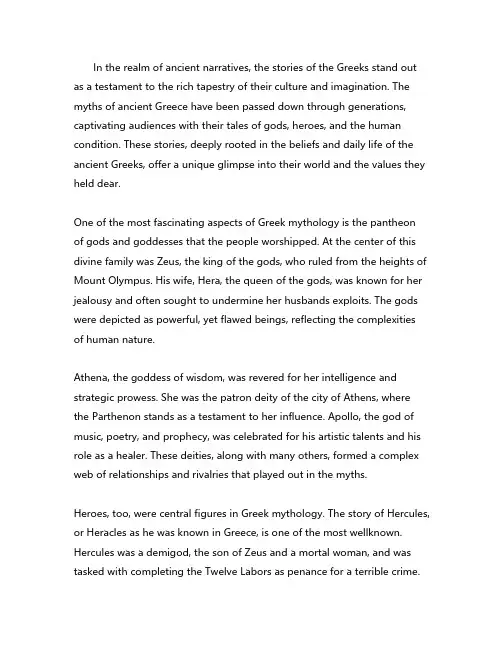
In the realm of ancient narratives, the stories of the Greeks stand out as a testament to the rich tapestry of their culture and imagination. The myths of ancient Greece have been passed down through generations, captivating audiences with their tales of gods, heroes, and the human condition. These stories, deeply rooted in the beliefs and daily life of the ancient Greeks, offer a unique glimpse into their world and the values they held dear.One of the most fascinating aspects of Greek mythology is the pantheonof gods and goddesses that the people worshipped. At the center of this divine family was Zeus, the king of the gods, who ruled from the heights of Mount Olympus. His wife, Hera, the queen of the gods, was known for her jealousy and often sought to undermine her husbands exploits. The gods were depicted as powerful, yet flawed beings, reflecting the complexitiesof human nature.Athena, the goddess of wisdom, was revered for her intelligence and strategic prowess. She was the patron deity of the city of Athens, where the Parthenon stands as a testament to her influence. Apollo, the god of music, poetry, and prophecy, was celebrated for his artistic talents and his role as a healer. These deities, along with many others, formed a complex web of relationships and rivalries that played out in the myths.Heroes, too, were central figures in Greek mythology. The story of Hercules, or Heracles as he was known in Greece, is one of the most wellknown. Hercules was a demigod, the son of Zeus and a mortal woman, and was tasked with completing the Twelve Labors as penance for a terrible crime.His strength and perseverance in the face of seemingly insurmountable challenges have made him a symbol of courage and determination.Another legendary hero is Perseus, who embarked on a perilous quest to rescue his mother and claim the throne of Argos. His encounter with Medusa, a Gorgon whose gaze could turn men to stone, is a tale filled with suspense and ingenuity. Perseus use of a mirrored shield to avoid direct eye contact with Medusa and his eventual beheading of the monster is a story that continues to resonate with themes of cunning and bravery.The story of Orpheus and Eurydice is a poignant tale of love and loss. Orpheus, a skilled musician, was so heartbroken by the death of his wife Eurydice that he journeyed to the Underworld to bring her back to life. His music moved even the cold heart of Hades, the god of the dead, who agreed to release Eurydice on one condition: Orpheus must not look back at her until they had both left the Underworld. Tragically, Orpheus inability to resist one final glance resulted in Eurydice being pulled back into the realm of the dead, a reminder of the fragility of human relationships and the consequences of our actions.Greek myths also served as cautionary tales, warning against the dangers of hubris, or excessive pride. The story of Icarus and his father Daedalus is a prime example. Daedalus, a skilled craftsman, created wings made of feathers and wax for himself and his son to escape from the island of Crete. However, Icarus, in his exuberance, ignored his fathers warnings and flew too close to the sun, causing the wax to melt and leading to his tragic fall into the sea.These myths were not only entertaining but also educational, imparting moral lessons and providing a framework for understanding the world. They were a means of preserving cultural identity and values, and they continue to influence modern literature, art, and even scientific nomenclature.The enduring appeal of Greek mythology lies in its timeless themes and its ability to explore the depths of human emotion and experience. The stories of gods and heroes, of love and loss, of triumph and tragedy, continue to captivate us, reminding us of our shared humanity and the universality of our struggles and aspirations. As we delve into these ancient tales, we find not only a reflection of the Greeks world but also a mirror to our own.。
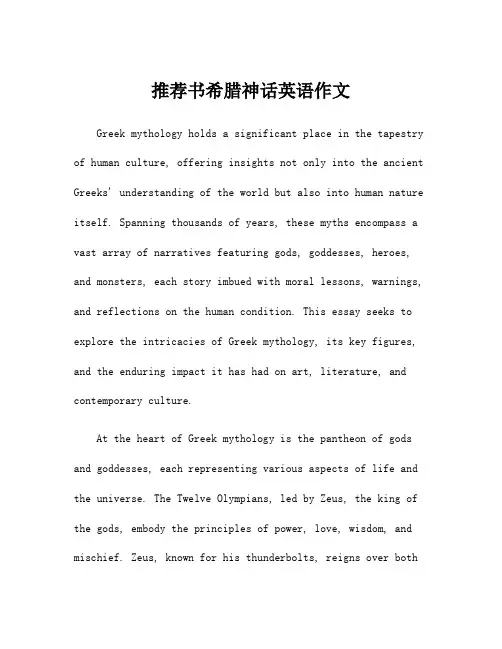
推荐书希腊神话英语作文Greek mythology holds a significant place in the tapestry of human culture, offering insights not only into the ancient Greeks' understanding of the world but also into human nature itself. Spanning thousands of years, these myths encompass a vast array of narratives featuring gods, goddesses, heroes, and monsters, each story imbued with moral lessons, warnings, and reflections on the human condition. This essay seeks to explore the intricacies of Greek mythology, its key figures, and the enduring impact it has had on art, literature, and contemporary culture.At the heart of Greek mythology is the pantheon of gods and goddesses, each representing various aspects of life and the universe. The Twelve Olympians, led by Zeus, the king of the gods, embody the principles of power, love, wisdom, and mischief. Zeus, known for his thunderbolts, reigns over bothgods and mortals, often intervening in human affairs to maintain order or to enforce his will. His numerous liaisons with goddesses and mortal women produced a plethora of demigods, the most famous of whom include Hercules and Perseus. These characters often embody the struggle between human frailty and divine power, a recurring theme in mythology.Hera, Zeus's wife and sister, represents the institution of marriage and fidelity but is often portrayed as vengeful, primarily due to her husband's infidelities. Her jealousy leads to countless trials for Zeus's lovers and their offspring, highlighting the often tumultuous relationships among the deities. Such dynamics are essential for understanding Greek mythology, as they reflect the Greeks' beliefs about relationships, power, and the consequences of betrayal.Another prominent figure in Greek mythology is Athena, the goddess of wisdom and warfare. Born from Zeus's forehead, she symbolizes strategic warfare—contrasting the chaos often associated with Ares, the god of war. Athena's role as a protector of cities, particularly Athens, underscores her significance in Greek culture. The Parthenon, dedicated to her, stands as a testament to her enduring influence. Stories of her guidance to heroes, such as Odysseus in "The Odyssey," illustrate her role not only as a warrior but also as a mentor and a source of wisdom, reinforcing the idea that intelligence and strategy triumph over brute force.The tales of heroes serve as another crucial component of Greek mythology, illustrating the ideal characteristics that the Greeks valued: bravery, honor, and humility. Characters such as Achilles, the central figure of Homer's "Iliad," represent the complexities of heroism. Achilles embodies both the glory of valor on the battlefield and the tragic flaws that lead to his downfall—his rage and pride. The story ofAchilles reveals a duality that resonates deeply with human experience, embodying the struggle between personal desire and the greater good, a theme that appeals to audiences even today.Furthermore, Odysseus, the protagonist of "The Odyssey," exemplifies cleverness and resilience. His lengthy journey home from the Trojan War illustrates the unpredictability of life and the trials one must endure to achieve their goals. The myriad encounters with mythical creatures, such as the Cyclops Polyphemus and the enchanting Sirens, not only serve as thrilling narratives but also carry deeper meanings about temptation and the importance of perseverance. Odysseus's ability to navigate these challenges underscores the human capacity for innovation and adaptability, qualities the Greeks highly esteemed.Monsters play an equally essential role in Greek mythology, often representing the fears and challenges facedby humanity. The Minotaur, a creature that is half-man, half-bull, symbolizes the chaos that arises from unchecked desires and the monstrous nature of humanity itself. The story of Theseus and the Minotaur, with its labyrinthine twists and turns, reflects the journey of confronting one’s fears and emerging victorious — another theme that resonates universally. Similarly, Medusa, once a beautiful maiden cursed to become a monster, reflects the notion that people can be transformed by their circumstances and the importance of compassion in the face of tragedy.As intriguing as the myths themselves are, the manner in which they were transmitted and transformed over time is equally important. Oral tradition was pivotal in the dissemination of these stories, and later, the works of poets like Homer and Hesiod codified them into written form. "The Iliad" and "The Odyssey" not only served as literary masterpieces but also functioned as foundational texts that shaped Greek identity and culture. These epics provided moralguidance and a shared understanding of the world, allowing future generations to reflect on their place within the cosmos.The influence of Greek mythology extends far beyond ancient Greece, permeating various aspects of modern culture. The language used today is riddled with references to Greek myths; terms like "Herculean," "narcissism," and "panic" derive from these ancient tales, demonstrating their lasting impact. In literature, countless authors have drawn upon these myths for inspiration, reinterpreting and reshaping them to comment on contemporary issues. For instance, the story of Prometheus, who stole fire from the gods to give to humanity, serves as a powerful allegory for defiance against tyranny and the quest for knowledge, themes that resonate with modern audiences in an age of rapid technological advancement and ethical dilemmas.In the realm of visual art, Greek mythology has provideda rich source of inspiration for artists throughout the ages. The dramatic narratives of love, betrayal, heroism, andtragedy have been captured in sculptures, paintings, and mosaics, bringing these ancient stories to life. Renowned artists, such as Sandro Botticelli and Jean-Baptiste Carpeaux, have illustrated mythological themes, allowing viewers to connect with the emotions and moral lessons encapsulatedwithin these narratives. Renaissance thinkers often turned to classical mythology as a means to explore humanism, revealing a continual search for meaning that transcends time and culture.In contemporary media, Greek myths have been reimagined and adapted into movies, television shows, and literature, attracting new audiences and sparking renewed interest inthese ancient tales. Films like "Clash of the Titans" and "300" recreate epic battles and mythical creatures, while novels such as Rick Riordan's "Percy Jackson & The Olympians"series introduce these themes to younger generations, blending them with contemporary settings and issues. Such adaptations highlight the adaptability of Greek mythology and its capacity to resonate across different contexts, making it relevant for modern society.Moreover, the themes of Greek mythology remain pertinent to current discussions surrounding ethics, identity, and the human experience. As we navigate a world filled with moral ambiguities and complex societal dynamics, the stories of Greek gods and heroes remind us of our own struggles, victories, and failures. The lessons embedded within these myths prompt reflection on human behavior, urging us to consider the consequences of our actions and the interconnectedness of humanity.In conclusion, Greek mythology is a rich and enigmatic world that continues to captivate and inspire audiences around the globe. Through its complex pantheon of gods andgoddesses, tales of heroism, and encounters with monsters, ancient narratives reflect enduring truths about the human experience. The impact of these myths on art, literature, and contemporary culture underscores their significance, providing a bridge between the past and present. As we explore these myths, we not only gain insight into the ancient Greeks’ worldview but also discover reflections of our own lives, making Greek mythology a timeless and invaluable part of human heritage.。
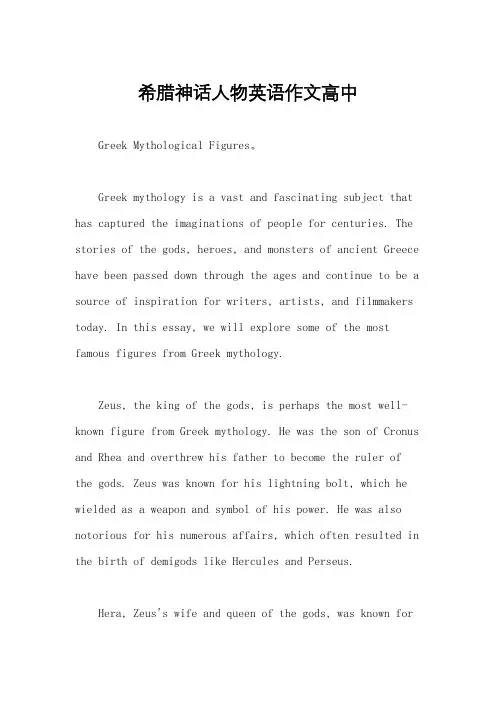
希腊神话人物英语作文高中Greek Mythological Figures。
Greek mythology is a vast and fascinating subject that has captured the imaginations of people for centuries. The stories of the gods, heroes, and monsters of ancient Greece have been passed down through the ages and continue to be a source of inspiration for writers, artists, and filmmakers today. In this essay, we will explore some of the most famous figures from Greek mythology.Zeus, the king of the gods, is perhaps the most well-known figure from Greek mythology. He was the son of Cronus and Rhea and overthrew his father to become the ruler of the gods. Zeus was known for his lightning bolt, which he wielded as a weapon and symbol of his power. He was also notorious for his numerous affairs, which often resulted in the birth of demigods like Hercules and Perseus.Hera, Zeus's wife and queen of the gods, was known forher jealousy and vengefulness. She was often depicted as a peacock and was the protector of marriage and childbirth. Hera was also the mother of Ares, the god of war, and Hephaestus, the god of fire and blacksmithing.Poseidon, the god of the sea, was one of Zeus's brothers. He was known for his trident, which he used to control the waves and create storms. Poseidon was also the patron of horses and was often depicted riding a chariot pulled by sea horses.Hades, another of Zeus's brothers, was the god of the underworld. He was often portrayed as a dark and sinister figure, ruling over the dead and the souls of the damned. Hades was married to Persephone, the goddess of spring and vegetation, who he abducted and brought to the underworld to be his queen.Athena, the goddess of wisdom and warfare, was born fully grown and armored from the head of Zeus. She was known for her intelligence, strategic thinking, and skill in battle. Athena was also the patron of craftspeople andwas often depicted with a shield and spear.Apollo, the god of music, poetry, and prophecy, was the son of Zeus and Leto. He was known for his beautiful singing voice and his ability to play the lyre. Apollo was also the god of healing and was often associated with the sun.Artemis, Apollo's twin sister, was the goddess of the hunt and the moon. She was known for her skill with a bow and arrow and was often depicted with a pack of hunting dogs. Artemis was also the protector of young women and was associated with childbirth.These are just a few of the many fascinating figures from Greek mythology. Their stories have inspired countless works of art and literature and continue to captivate audiences today. Whether you are interested in the gods, heroes, or monsters of ancient Greece, there is always something new to discover in the rich and complex world of Greek mythology.。
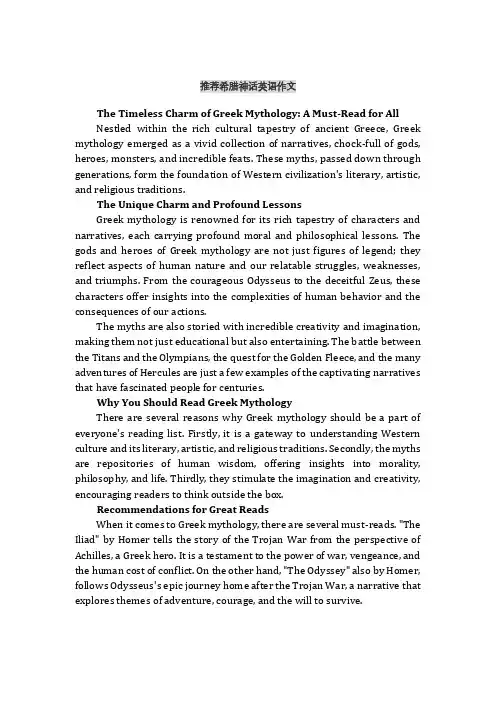
推荐希腊神话英语作文The Timeless Charm of Greek Mythology: A Must-Read for AllNestled within the rich cultural tapestry of ancient Greece, Greek mythology emerged as a vivid collection of narratives, chock-full of gods, heroes, monsters, and incredible feats. These myths, passed down through generations, form the foundation of Western civilization's literary, artistic, and religious traditions.The Unique Charm and Profound LessonsGreek mythology is renowned for its rich tapestry of characters and narratives, each carrying profound moral and philosophical lessons. The gods and heroes of Greek mythology are not just figures of legend; they reflect aspects of human nature and our relatable struggles, weaknesses, and triumphs. From the courageous Odysseus to the deceitful Zeus, these characters offer insights into the complexities of human behavior and the consequences of our actions.The myths are also storied with incredible creativity and imagination, making them not just educational but also entertaining. The battle between the Titans and the Olympians, the quest for the Golden Fleece, and the many adventures of Hercules are just a few examples of the captivating narratives that have fascinated people for centuries.Why You Should Read Greek MythologyThere are several reasons why Greek mythology should be a part of everyone's reading list. Firstly, it is a gateway to understanding Western culture and its literary, artistic, and religious traditions. Secondly, the myths are repositories of human wisdom, offering insights into morality, philosophy, and life. Thirdly, they stimulate the imagination and creativity, encouraging readers to think outside the box.Recommendations for Great ReadsWhen it comes to Greek mythology, there are several must-reads. "The Iliad" by Homer tells the story of the Trojan War from the perspective of Achilles, a Greek hero. It is a testament to the power of war, vengeance, and the human cost of conflict. On the other hand, "The Odyssey" also by Homer, follows Odysseus's epic journey home after the Trojan War, a narrative that explores themes of adventure, courage, and the will to survive.Other noteworthy reads include "Metamorphoses" by Ovid, a retelling of Greek myths in a narrative format, and "Theogony" by Hesiodus, which details the creation of the universe and the gods.Connecting with Modern LifeGreek mythology is not just relevant in the academic sphere; it finds resonance in our daily lives too. The heroes' journeys of self-discovery, the gods' battles with their own flaws, and the monsters' terrifying yet relatable traits all offer insights into our own lives and struggles. By applying these lessons to modern-day scenarios, we can gain valuable insights into our behavior, decisions, and relationships.In ConclusionGreek mythology is a rich and diverse cultural heritage that offers insights into human nature, morality, and the complexities of life. It is a must-read for everyone, regardless of age or background, as it has the power to captivate, educate, and inspire. By delving into the world of Greek mythology, we not only gain a deeper understanding of our cultural roots but also discover timeless wisdom that can guide us through life's challenges. Let's embrace this ancient wisdom and draw inspiration from it, making it relevant in our modern world.。
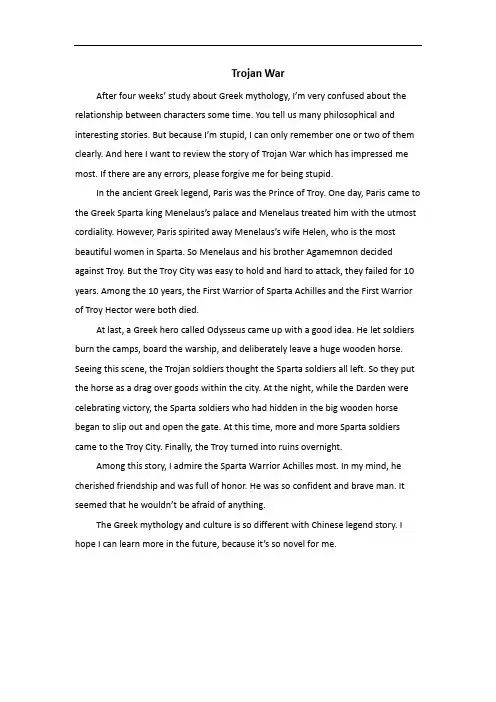
Trojan WarAfter four weeks’ study about Greek mythology, I’m very confused about the relationship between characters some time. You tell us many philosophical and interesting stories. But because I’m stupid, I can only remember one or two of them clearly. And here I want to review the story of Trojan War which has impressed me most. If there are any errors, please forgive me for being stupid.In the ancient Greek legend, Paris was the Prince of Troy. One day, Paris came to the Greek Sparta king Menelaus’s palace and Menelaus treated him with the utmost cordiality. However, Paris spirited away Menelaus’s wife Helen, who is the most beautiful women in Sparta. So Menelaus and his brother Agamemnon decided against Troy. But the Troy City was easy to hold and hard to attack, they failed for 10 years. Among the 10 years, the First Warrior of Sparta Achilles and the First Warrior of Troy Hector were both died.At last, a Greek hero called Odysseus came up with a good idea. He let soldiers burn the camps, board the warship, and deliberately leave a huge wooden horse. Seeing this scene, the Trojan soldiers thought the Sparta soldiers all left. So they put the horse as a drag over goods within the city. At the night, while the Darden were celebrating victory, the Sparta soldiers who had hidden in the big wooden horse began to slip out and open the gate. At this time, more and more Sparta soldiers came to the Troy City. Finally, the Troy turned into ruins overnight.Among this story, I admire the Sparta Warrior Achilles most. In my mind, he cherished friendship and was full of honor. He was so confident and brave man. It seemed that he wouldn’t be afraid of anything.The Greek mythology and culture is so different with Chinese legend story. I hope I can learn more in the future, because it’s so novel for me.。
女神英文介绍带翻译Goddess Introduction – Meet the Most Beautiful Women in the World。
女神介绍–认识世界上最美的女性。
Throughout history, women have been revered and admired for their beauty, grace, and intelligence. They have been called goddesses, and for good reason. In this article, we will introduce you to some of the most beautiful women in the world, who are often referred to as goddesses.历史上,女性因其美丽、优雅和智慧而备受尊敬和钦佩。
她们被称为女神,这是有充分理由的。
在本文中,我们将向您介绍一些被称为女神的世界上最美丽的女性。
1. Gal Gadot。
Gal Gadot is an Israeli actress and model who rose to fame for her role as Wonder Woman in the DC ExtendedUniverse. She is not only beautiful but also a talented actress, having won the Miss Israel title in 2004 before pursuing a career in acting. Gadot is a true goddess, with her stunning looks and fierce personality.盖尔·加朵是一位以扮演DC漫画宇宙中的神奇女侠而闻名的以色列女演员和模特。
神话人物介绍:宙斯与嫦娥**Zeus and Chang'e: An Introduction to Mythological Figures**In the vast and enchanting realm of mythology, there exist countless figures who embody the imagination and aspirations of ancient cultures. Among these, Zeus from Greek mythology and Chang'e from Chinese mythology stand out as two of the most fascinating and influential characters. Their stories, symbols, and cultural significance offer a window into the rich tapestry of human mythology.Zeus, the supreme God of the Greek pantheon, is associated with sky and thunder. His reign over the gods is absolute, and he is often depicted as a majestic figure with a thunderbolt as his weapon. The stories surrounding Zeus are filled with drama, adventure, and love affairs. His love for mortal women often leads to the birth of heroes and demi-gods, further enriching the tapestry of Greek mythology. Zeus's power and influence extend throughout the Greek world, making him a central figure in Greek culture and religion.On the other hand, Chang'e, the Moon Goddess of Chinese mythology, represents the serene and ethereal beauty of the moon. Her legend is deeply rooted in Chinese culture and is often associated with the Mid-Autumn Festival, a time of moon gazing and family reunions. Chang'e's story, while different from Zeus's in many ways, shares a common thread of love and sacrifice. She is known for her grace and compassion, often depicted as a beautiful woman with a rabbit at her side.Zeus and Chang'e, while distinct in their origins, symbols, and cultural contexts, both embody the essence of mythology: the intersection of the divine and the human, the blend of imagination and reality. Their stories are not just legends but also a reflection of the values, beliefs, and aspirations of their respective cultures.Zeus's reign over the Greek gods and his love affairs with mortal women reflect the Greek's emphasis on power, drama, and individualism. His relationships with women such as Hera, Europa, and Semele are not just romantic entanglements but also serve to illustrate the themes of power, jealousy, and transformation. These themes arecentral to Greek mythology and culture, making Zeus apivotal figure in understanding the Greek world.On the other hand, Chang'e's association with the moon and her role as a goddess of love and beauty reflect the Chinese emphasis on harmony, nature, and femininity. Her legend, which tells of her ascension to the moon after drinking a potion that made her immortal, is a testament to the Chinese belief in immortality and the transcendentpower of nature. Chang'e's image as a graceful and compassionate goddess is deeply ingrained in Chinese culture, making her a symbol of beauty and longing.In conclusion, Zeus and Chang'e, two figures from different mythological traditions, offer insights into the rich and diverse world of mythology. Their stories, symbols, and cultural significance are not just a testament to the imagination and creativity of ancient cultures but also a bridge between the past and the present, connecting us tothe ancient wisdom and aspirations of humanity. As we delve into their legends, we gain a deeper understanding of ourselves and the world we inhabit.**宙斯与嫦娥:神话人物介绍**在神话的广阔而迷人的领域中,存在着无数体现古代文化想象和渴望的人物。
缪斯的人物介绍英文作文英文回答:The Muses, in Greek mythology, are the nine goddesses of the arts. They are the daughters of Zeus, the king of the gods, and Mnemosyne, the goddess of memory. The Muses are:Calliope: Epic poetry。
Clio: History。
Erato: Love poetry。
Euterpe: Music。
Melpomene: Tragedy。
Polyhymnia: Hymns。
Terpsichore: Dance。
Thalia: Comedy。
Urania: Astronomy。
The Muses are often depicted as young women, beautiful and graceful. They are usually dressed in flowing robes and are often shown carrying musical instruments or other objects that represent their respective arts.The Muses are invoked by poets and artists before they begin their work. They are believed to inspire creativity and to help artists create works of beauty and excellence.The Muses are also associated with the sacred springs of Parnassus and Helicon. These springs are said to have the power to inspire poets and artists.中文回答:缪斯在希腊神话中是掌管艺术的九位女神。
Athena: The Goddess of Wisdom andCourageIn the pantheon of Greek mythology, Athena stands as a beacon of wisdom and courage, a goddess who embodies the ideals of intelligence and strategy. Born from the head of Zeus, the supreme God, she is often described as the paragon of virginity, a symbol of purity and strength. Her association with the owl, a bird often seen as wise and observant, further underscores her role as the goddess of wisdom.Athena's role in Greek mythology is vast and diverse, encompassing both war and peace. She is renowned for her strategic mind and military prowess, often serving as a guiding force for heroes and mortals alike. Her involvement in the Trojan War, where she aided the Greeks with her wisdom and courage, is a testament to her indomitablespirit and resolve.Her relationship with Poseidon, the god of the sea, is also noteworthy. While Poseidon represented the raw, emotional power of the sea, Athena represented the calculated, rational mind. This contrast highlights thedual nature of wisdom: it is both intuitive and strategic, emotional and rational.Athena's influence extends beyond the realm of mythology, however. She serves as an inspiration for countless individuals who strive to embody her qualities of wisdom and courage. Her story teaches us that true strength lies not just in physical might, but in the mind and the heart. She reminds us that in the face of adversity, it is our wit and resolve that will carry us through.In conclusion, Athena is a figure who transcends the boundaries of mythology, serving as a timeless symbol of wisdom and courage. Her story is one that resonates with us today, urging us to harness the power of our minds and hearts to overcome any challenge.**雅典娜:智慧与勇气的女神**在希腊神话的神殿里,雅典娜是智慧与勇气的明灯,是智慧和策略的化身。
希腊神话十二主神英文介绍In Greek mythology, there are twelve Olympian gods and goddesses, who are considered to be the major deities of the Greek pantheon. These twelve gods and goddesses reside on Mount Olympus and rule over various aspects of human life. Here is a brief English introduction to each of the twelve Olympian gods and goddesses:1. Zeus: The king of the gods and the ruler of the sky. Zeus is the god of thunder and lightning and is known for his power and wisdom.2. Hera: The queen of the gods and the goddess of marriage and childbirth. She is often depicted as a jealous and vengeful goddess.3. Poseidon: The god of the sea and earthquakes. Poseidon is known for his volatile temper and his trident, which he uses to control the sea.4. Demeter: The goddess of agriculture and grain. Demeter is associated with the harvest and is often depicted holding a sheaf of wheat.5. Athena: The goddess of wisdom, courage, and strategic warfare. Athena is a virgin goddess and is known for her intelligence and strategic skills.6. Apollo: The god of light, music, and healing. Apollo is often depicted with a lyre, and his oracle at Delphi was considered one of the most important in ancient Greece.7. Artemis: The goddess of the hunt, wilderness, and childbirth. Artemis is often depicted with a bow and arrow, and she is a protector of young girls and women.8. Hermes: The messenger of the gods and the god of travelers, trade, and thieves. Hermes is known for his speed and agility.9. Aphrodite: The goddess of love and beauty. Aphrodite is often depicted with a mirror and a dove and is associated with desire and romantic love.10. Hephaestus: The god of fire, blacksmiths, and craftsmen. Hephaestus is known for his skill in forging weapons and is often depicted with a hammer and anvil.11. Ares: The god of war and violence. Ares is often depicted witha spear and shield, and he is associated with bloodlust and the chaos of battle.12. Dionysus: The god of wine, celebration, and ecstasy. Dionysus is often depicted with a wine cup and grapevines and is associated with both the positive and negative aspects of excess.These twelve gods and goddesses were not only powerful figures in Greek mythology, but they also played important roles in Greek religion and culture.。
想了解希腊神话的英语作文Introduction:Greek mythology is a fascinating realm of stories that have captured the imagination of people for centuries. It is a collection of tales that explain the world around us and the divine beings that shaped it. This essay delves into the essence of Greek mythology, its key figures, and the impactit has had on Western culture and the English language.Body:1. The Pantheon of Gods:Greek mythology is home to a vast array of gods and goddesses, each with their own distinct personalities and domains. Zeus, the king of the gods, ruled the skies and was known for his thunderbolts. His wife, Hera, was the queen of the gods andthe protector of marriage and family. Other notable deities include Poseidon, the god of the sea, and his brother Hades, the god of the underworld. The beauty of these myths lies in their humanization of the divine, making the gods relatable and engaging.2. Heroes and Their Quests:Heroes in Greek mythology are often depicted as semi-divine beings with extraordinary abilities. The epic tales of heroes like Hercules, Theseus, and Perseus are filled with trialsand tribulations. Hercules, for example, is famous for his twelve labors, which were a series of nearly impossible taskshe had to complete as penance for a terrible mistake. These stories of heroism and bravery continue to inspire and entertain us today.3. The Influence on Modern Culture:Greek mythology has left an indelible mark on modern culture, particularly in literature and the arts. Many English words have their roots in Greek mythology, such as "atlas" (from the Titan who held up the sky) and "narcissism" (from the beautiful youth Narcissus who fell in love with his own reflection). Additionally, countless works of literature, from Shakespeare's plays to modern fantasy novels, draw upon these ancient stories for inspiration.4. Moral Lessons and Philosophical Insights:The stories of Greek mythology often contain profound moral lessons and philosophical insights. For instance, the story of Icarus, who flew too close to the sun with wings made of feathers and wax, warns us against the dangers of hubris and the importance of humility. These timeless lessons continue to resonate with contemporary audiences.Conclusion:Greek mythology is more than just a collection of ancient stories; it is a cultural treasure that has enriched the English language and continues to inspire creativity and thought. By understanding these myths, we gain a deeper appreciation for the world's literature, art, and the values that have shaped our society. Whether it's through the study of literature, the enjoyment of art, or the exploration oflanguage, Greek mythology remains a captivating and essential part of our cultural heritage.。
Because of its rich and strange imagination, Ancient Greek mythology has become the source of Western literature. Many Western literatures have learned nutrition from it. As a very important part of the Greek myth, those vivid female figures have do a lot to Western Literary works. Several initial studies insist that there is no doubt that the Ancient Greek mythology is the source of female figures in Western Literary works. At the same time, it is generally recognized that the transition of Greek goodness has great influence on female roles in western literary works. According to the results of present study, those goodness can be categorized into the following three different types: the historical symbol, Helen; “the familial angel”, Parnearopa; “the shrew”, Medea. And it can be also found that how the figure in Ancient Greek mythology influent female roles in Western Literary works. But the specific and comprehensive relationship between them hasn’t been studied deeply. This review will firstly analyze those female images’characteristics in Greek mythology and Western Literary works respectively. Further, it will compare those figures and try to find the differences and connections. More important, in the end of this paper, it will draw a conclusion of the influence of female goodness in Ancient Greek mythology on Western Literary works.。